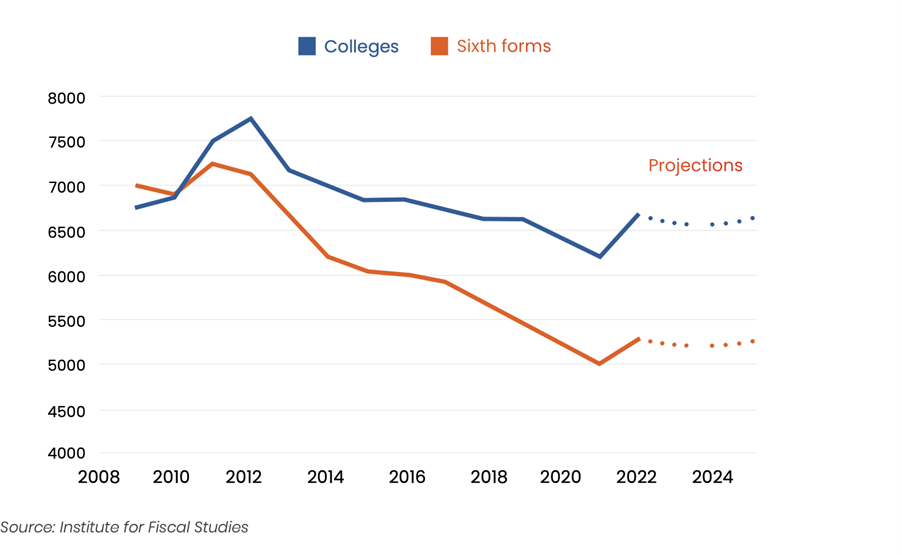Budget Spring Statement confirms FE’s position as Forgotten Education

Let’s not mince words. This Budget was a complete non-event for the further education, apprenticeship and skills sector.
It confirmed in the minds of many what a former education secretary, Sir Gavin Williamson, said at the start of the pandemic:
“FE stands for Further Education but for too long it may as well have stood for Forgotten Education.”
Since then we’ve had four secretaries of state in a Whitehall department that spent a total budget of £114.5 billion in 2021-22. (England).
The further education and skills part of the Department for Education’s budget represents £5.8 billion, or just 6.5% of the total.
What these figures demonstrate is that to govern is to choose. And currently, FE is at the end of the queue.
Figure 1. Annual spending per student (adjusted for inflation, £ in total 2022/23 terms)

Politicians are fond of telling us their backstories. The incumbent education secretary, Gillian Keegan, was an apprentice in Liverpool at 16.
She often tells audiences that skills are in her lifeblood and that the education department under her will deliver “world-class” qualifications, such as government-owned T levels.
It’s a depressing fact that policymakers are more than happy to praise the sector when a photo opportunity comes begging.
But when it really matters, the sector is largely forgotten.
Only weeks ago, some parts of FE came together in a ‘coalition’ to make demands of the government.
It was backed up by not only opposition MPs, as one might expect, but MPs from the governing Conservative Party as well.
On 13 March, 12 Tory MPs wrote to the Chancellor, Jeremy Hunt, demanding an immediate cash injection of £400 million to cope with rising cost pressures in FE colleges.
All of it has fallen on deaf ears.
For sure, the Budget had some useful supply-side measures to try and reverse the country’s abysmal labour market inactivity rates.
More than a fifth of those who are of working age are not in employment, adding to the country’s historically high tax burden and drag on productivity.
Hunt also demonstrated that money could be found for electorally sensitive priorities. For example, billions were handed out to motorists in frozen fuel duty charges, giving some campaigning tabloid papers the headlines they were looking for.
Meanwhile, we await the small print on exactly what these ‘new types of apprenticeships’ – so-called ‘returnerships’ will mean for the sector.
Let’s hope it doesn’t result in the watering down of quality or confidence in the formal apprenticeship brand.
We should welcome the fact Treasury has handed DfE an additional £68 million in support of the over-50, in skills priority areas, horribly dubbed “boot camps”.
All this is no substitute for a proper national skills strategy.
Last December, the House of Commons Public Accounts Committee made the point:
‘DfE has not made clear what level of performance would constitute success for its skills programmes.’
Perhaps this is why no new investment was announced for the sector in the Spring Statement.
If ministers and sector leaders can’t explain what better outcomes skills policy will really deliver for UK plc, including knowing when we will reach the goal of a world-class post-16 system, is it any wonder that the bean counters in the Treasury are reluctant to invest further?
It was certainly one of the sentiments shared by my FE guests on a special publicly made available episode of the Federation of Awarding Bodies podcast: FAB Centraal
My podcast guests also discussed the strange case of what has happened to the Barber Review?
The former New Labour adviser, Sir Michael Barber, was announced alongside Sir Patrick Valance last autumn as independent advisers to the Chancellor.
We’ve never really fully understood what Barber is up to.
We’ve never really fully understood what Barber is up to. He told one sector publication he was working unpaid for only a day a week up until the end of March.
Official sources I speak to tell me he is being very narrow in who he speaks to or takes advice from.
What a pity and a wasted opportunity that he can’t even write out to FE sector leaders and hold some proper round tables with us.
Sir Patrick has already concluded his work for Jeremy Hunt, resulting in all 9 of his recommendations to support Britain as a scientific super-power.
I get the sense that the Barber Review is being held back to try and ensure greater political effect closer to the next general election.
Just look how in this Budget, the government announced a new childcare policy for very young pre-school children which looks remarkably similar to what Labour was offering.
It’s also clear that the self-appointed guru of ‘deliverology’ is perhaps struggling to make sense of a skills system that has got more complex in recent years.
Since July 2020, when Gavin Williamson made his comments about FE standing for forgotten education, there has been no less than 80 major departmental policy consultations and regulatory (qualifications) initiatives announced, according to unpublished research by FAB’s policy team.
The sector is literally cracking under the weight of increased regulatory burden and bureaucratic costs.
Leviathan is sitting astride us.
Meanwhile, FE has been starved of investment. It is what Sir Philip Augar described as a sector that was demoralised, in his seminal post-18 review.
It’s a real shame this Budget has done absolutely nothing to shift the dial on these negative perceptions or to reverse decades of relative neglect.
There’s always the next financial statement to look forward to.
With thanks to:
- Imran Tahir, Institute for Fiscal Studies
- Emily Austin, Association of Apprentices
- Isa Mutlib, Careers Camp
- Dr Lizzie Gauntlett, Federation of Awarding Bodies












Responses